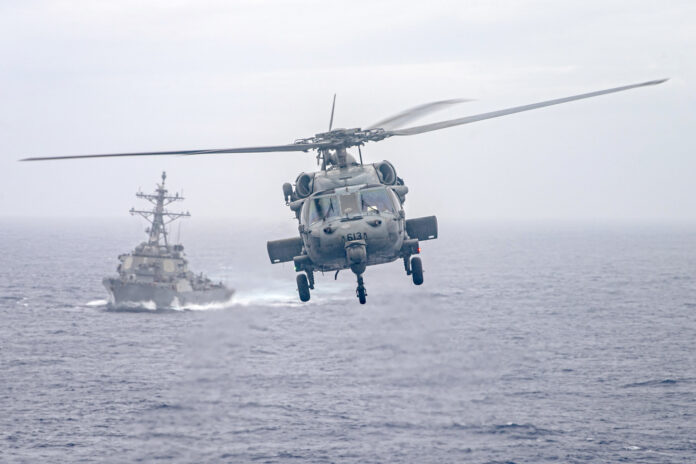
The United States Navy is preparing to dispatch an amphibious squadron to the southern Caribbean as part of the show of force against Latin American drug cartels. As Colombia braces for the political and economic fallout of a potential military escalation in Venezuela, the presence of this combat squadron comes at a sensitive moment for the hemisphere: Colombian President Gustavo Petro has issued sharp warnings over the consequences of an invasion of Venezuela, while former President Álvaro Uribe Vélez was released from house arrest this week, quickly reasserting himself on the national stage with renewed political vigor.
The USS San Antonio, USS Iwo Jima, and USS Fort Lauderdale could arrive off Venezuela’s coast as early as Sunday. The vessels are carrying roughly 4,500 service members, including 2,200 Marines, claim two sources briefed by Reuters. The squadron is part of President Donald Trump’s effort to clamp down on transnational drug trafficking networks, though analysts say the operation risks stoking regional instability at a moment when Colombia and Venezuela are also witnessing a rise in diplomatic tensions.
Speaking Wednesday at the Teatro Colón in Bogotá, Petro raised the alarm about the potential consequences for Colombia if the U.S. were to greenlight an intervention in Venezuela. Without naming Washington – or U.S President Trump – Petro insisted that any invasion would trigger a surge in migration across Colombia’s already porous 2,000-kilometer border.
“If they invade Venezuela, the numbers [of migrants] triple,” he said. “And if they invade Venezuela, the price of oil falls below 50 dollars and Ecopetrol goes bankrupt; this has been technically demonstrated.”
The president argued that such a shock would accelerate the decline of Ecopetrol, Colombia’s state-owned oil company, underscoring what he described as the urgent need for an energy transition toward renewables. For critics of the leftist leader, Petro has consistently backed Venezuelan dictator Nicolás Maduro, and never recognized the legitimate President of Venezuela, Edmundo González, after he won a landslide victory in the July 28, 2024, election. The U.S administration of Joe Biden officially recognized the Venezuelan opposition candidate as “president-elect” four months later.
The warnings came just hours after Colombia’s Superior Tribunal ordered the release of Álvaro Uribe Vélez from house arrest, pending his appeal of a 12-year sentence for bribery and witness tampering. Uribe, who led Colombia from 2002 to 2010 with staunch U.S. backing, remains one of the country’s most polarizing figures.
The two-term leader was convicted earlier this month of threatening and attempting to bribe witnesses who linked him to the formation of right-wing paramilitary groups in the 1990s. His lawyers successfully argued that his right to due process had been violated, prompting the court to lift the house arrest order until a final ruling is issued by mid-October.
Uribe has always denied charges levied against him and claims he is part of a political persecution by left-wing politicians and social media influencers. For many Colombians, his release has been welcomed after the controversial ruling of by the criminal judge Sandra Heredia against Uribe on July 28, this year.
In his first public appearance since his release, Uribe traveled on Wednesday to Sabaneta, Antioquia, that has long served as a conservative stronghold. There, he outlined his political itinerary, signaling an intention to resume an active role in shaping Colombia’s opposition to Petro’s government.
Uribe announced he would hold a symbolic rally in southern Bogotá on Saturday, at the same site where Senator Miguel Uribe Turbay, his political protegée, was gunned down on June 7 while addressing supporters in the neighborhood of Modelia, Fontibón. Senator Miguel Uribe’s assassination, carried out during a campaign event at Parque El Golfito, shocked Colombia’s political establishment and underscored the persistent dangers of public life in a country where violence continues to haunt democracy.
“The Saturday act will be one of faith and a call to the homeland, from the very place where Miguel Uribe was attacked,” Uribe said, invoking the late senator’s memory. He also lashed out at Petro’s recent overtures toward Venezuela and his suggestion of creating a binational zone, saying: “I do not understand why they want to hand over the Armed Forces to Maduro’s narco-dictatorship and declare war on brotherly Peru, which has defended democracy.”
The convergence of these events – U.S. warships edging toward Venezuela, Petro warning of oil and migration shocks, and Uribe reclaiming the political stage – illustrates the volatility of Colombia’s current moment.
Washington’s decision to deploy forces close to Venezuela revives memories of past interventions in Latin America, often justified by counter-narcotics efforts but entangled in broader geopolitical rivalries. For Colombia, the implications are immediate: a potential humanitarian crisis at the border, renewed debates over energy dependence, and heightened political polarization at home.
Uribe’s reappearance adds yet another layer. By linking his comeback to the memory of a presidential hopeful, he has recast himself as both a political survivor and a rallying point for the conservative opposition. Whether he succeeds in reclaiming his former influence will depend on how Colombians weigh his legacy against a slate of corruption allegations of the country’s first leftist government.
